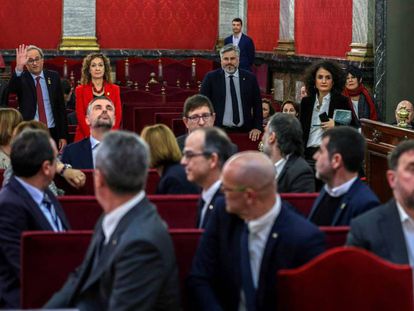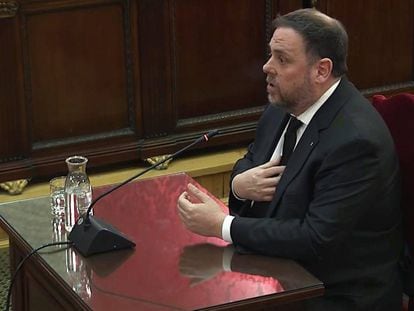Prosecutor in Catalan secession trial calls 2017 events a “coup d’état”
In closing arguments today, the prosecution in the Supreme Court case sought to prove the pro-independence leaders had committed rebellion and not the lesser offense of sedition


Before the ongoing trial of the Catalan pro-independence leaders began, there was a theory circulating among some legal sectors and the defense lawyers that the public prosecutor would begin the trial with the highest accusations possible, which would then be softened when the definitive conclusions were presented. That moment arrived today, on day 50 of a trial that has seen more than 400 witnesses and three and a half months of court proceedings. And that theory proved to be way off the mark.
Political ideas or political policies that are not compatible with the constitutional order are not being persecuted
Prosecutor Javier Zaragoza
According to public prosecutor Javier Zaragoza, what happened in the fall of 2017 in Catalonia was “a coup d’etat.” It was, he told the court, the “substitution of one legal system for another by illegal means. That is what they were trying to do,” he said of the politicians on trial. “To overturn, suspend the Constitution completely or partially, and declare the independence of one part of the national territory. That is what the procés was,” he said, in reference to the Catalan word used to refer to the secessionist drive.
The public prosecutor thus ratified his initial accusation of rebellion, as well as putting new ideas and concepts on the table that had not previously been included in his writs or interventions in the court. During the hour that he spent presenting his closing arguments to the panel of judges who will rule on the case, Zaragoza summed up the main arguments against the defendants, and anticipated what the defense lawyers for the men and women on trial are likely to say next week when their turn comes for closing arguments.
The defendants in the case
As well as Oriol Junqueras of the Catalan Republican Left, the former leaders of two civil pro-independence associations, Jordi Sànchez and Jordi Cuixart, are also on trial for their role in the secessionist drive, as well as former regional ministers Jordi Turull and Raül Romeva. In total there are 12 defendants on trial, nine of whom – including female politicians Carme Forcadell and Dolors Bassa – are being held in custody while the legal process takes place. Five of the other politicians involved in the secessionist drive – including then-premier Carles Puigdemont – fled Spain in the wake of the events of 2017 and are still wanted for arrest by the Spanish authorities.
“The reason why they are being tried has nothing to do with the criminalization of political dissidence,” he said. “Political ideas or political policies that are not compatible with the constitutional order are not being persecuted. The reason is nothing more or less than having tried to liquidate the Constitution of 1978, a basic instrument of our coexistence. Having seriously attacked the constitutional order via illegal procedures.” Zaragoza referred to one of the defendants, Oriol Junqueras of the Catalan Republican Left (ERC) and the former Catalan deputy premier, as being the “driver” of this process.
With a stern tone, the public prosecutor attacked one of the basic strategies of the defense lawyers: that the events of 2017 – which saw an illegal referendum on independence held on October 1, followed by a unilateral declaration of independence passed in the regional parliament – were a legitimate exercise of constitutional rights, including those of demonstration, protest and freedom of choice.
In the prosecutor’s view, the “only violation of civil rights that is taking place today in Catalonia is that being stoically suffered and endured by those who defend the Constitution.” Zaragoza reproached the independence leaders for “positioning themselves on the margin of the law and refusing outright to negotiate” only to end up blaming the institutional conflict on those who comply with the rules. “This is an unprecedented exercise in cynicism,” he said.
The public prosecutor argued that what happened in Catalonia between September and October 2017 was “exceptional,” and as such, justified and deserved a resounding legal response. “Six thousand police officers were mobilized, and that is not normal,” he continued. “King [Felipe] had to give a speech of huge importance, which is also not normal. And Article 155 of the Constitution was used, something that is not employed for a simple act against public order,” he said, in reference to the constitutional clause used by the central government in Madrid to suspend Catalonia’s autonomous powers, sack the entire regional government and call new elections.
“These circumstances,” Zaragoza argued, “show that what happened was an attack against the constitutional order and not one against public order, which is why it cannot have been sedition,” he said, in reference to the lesser charge faced by some of the defendants.
The public prosecutor argued that what happened in Catalonia was “exceptional,” and as such, justified and deserved a resounding legal response
After Zaragoza, the other three public prosecutors who took part in the case went into the details of the facts attributed to the accused and the evidence against them that has been seen in the trial. Prosecutor Jaime Moreno presented the arguments for the existence of violence, an essential requisite to prove the offense of rebellion. He also produced a theory that had not been heard before. He argued that the 93 police officers who were injured on October 1 as they tried to stop the illegal referendum from going ahead could not be decoupled from the thousand or so citizens who were left with injuries due to the police violence. He claimed that they were all victims of the same events – events for which the independence leaders accused of rebellion are responsible for. “We are faced with events that left 1,093 injured,” Moreno stated.
Three of the four statements made by the prosecutors were focused on the offenses of rebellion. The fourth covered the accusation of misuse of funds. The attorneys argued that the behavior of the main defendants include all of the basic elements of this offense and not those of other crimes, such as sedition, of which they are accused by the Solicitor General’s Office, which answers directly to the government.
Fidel Cadena, the last prosecutor to speak, focused on the most technical part, which also has the greatest legal weight. He argued that the procés made use of the “management of the masses,” “the use of the Mossos” (a reference to the regional police force, which has been widely accused of passivity on the day of the illegal referendum), and the “sufficient violence” to achieve the objective of subverting the constitutional order. These elements, he continued, justify the application of Article 472 of the Spanish criminal code. “Sedition affects public calm; rebellion, the foundations of the rule of law.” Cadena added that violence “is the key” to the offense, but that the current letter of the law does not “require” an armed or military uprising for sedition to have been committed.
English version by Simon Hunter.












































